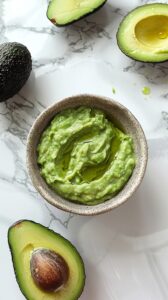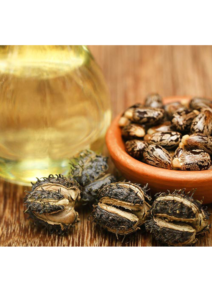Hair oil is often marketed as a magical solution for rapid hair growth, but the truth is, its primary role is to enhance hair health rather than directly stimulate growth.
While they may not drastically alter your hair’s growth cycle, they can improve scalp health, strengthen hair strands, reduce breakage, and make your hair look thicker and fuller. These benefits create the appearance of healthier, more vibrant hair over time.
Using the right hair oil can make a significant difference for Nigerians dealing with common issues like dry scalp, hair breakage, or damage from braids and relaxers. Each oil serves a unique purpose, from coconut oil for nourishment to shea butter for deep hydration and castor oil for promoting thickness.
This article is to guide you through the different types of hair oils, their benefits, key ingredients to look out for, and tips on incorporating them into your hair care routine.
Types of Hair Oil and Their Benefits
1. Coconut Oil: Best for Hair Repair

Coconut oil is one of the most beloved natural hair care remedies, known for its exceptional ability to repair and nourish damaged hair. Packed with lauric acid, a saturated fat that penetrates deep into the hair shaft, coconut oil strengthens hair from within and restores its natural vitality.
It’s particularly beneficial for reducing protein loss, a common issue caused by chemical treatments like dyeing and relaxing. Suitable for all hair types, coconut oil is a go-to solution for boosting moisture and improving overall hair health.
Read Further: Coconut Oil for Hair – Comprehensive Guide on its Benefits and Best Uses
Best Used For:
- Repairing damaged hair caused by chemical treatments or heat styling.
- Reducing protein loss and strengthening hair strands.
- Moisturizing dry or brittle hair.
You have two options for obtaining coconut oil in Nigeria: making it yourself or buying it already made.
Making Coconut Oil:
- Harvest mature coconuts and remove the husk to expose the white meat.
- Grate the coconut meat and mix it with warm water to extract the coconut milk by squeezing it through a cloth.
- Boil the coconut milk until the oil separates from the solids, then collect the oil.
- Filter the oil to remove impurities and store it in an airtight container.
Buying Ready-Made Coconut Oil: If you prefer not to make it yourself, ready-made coconut oil is widely available in Nigerian markets.
How To Use:
To use coconut oil effectively, warm it slightly before application to enhance absorption. Apply directly to your hair and scalp, ensuring even coverage. Leave it on for at least 30 minutes, then rinse thoroughly with shampoo for soft, nourished hair.
2. Rosemary Oil: Excellent for Boosting Hair Growth

Rosemary oil has gained attention for its potential to stimulate hair growth naturally. Some studies suggest it may be as effective as conventional hair growth treatments like minoxidil, without the side effects such as dryness or itching.
One study showed that rosemary oil improved hair count in individuals with androgenic alopecia (a common form of hair loss linked to hormonal imbalances) after consistent use for three to six months.
While the exact mechanism remains unclear, rosemary oil is celebrated for improving scalp circulation, which may promote healthier and thicker hair. For Nigerians dealing with hair thinning due to stress, braiding tension, or postpartum shedding, rosemary oil offers a natural and effective solution.
Best Used For:
- Stimulating hair regrowth naturally and safely.
- Improving scalp health and promoting stronger hair follicles.
- Providing an alternative to chemical-based hair treatments.
“In Nigeria, you can either make rosemary oil at home or purchase it pre-made.”
Making Rosemary Oil:
- Harvest fresh rosemary: Pick healthy rosemary leaves from the plant.
- Prepare the rosemary: Wash the rosemary leaves thoroughly to remove dirt and impurities. Pat them dry with a clean towel.
- Prepare your carrier oil: Choose a carrier oil like olive oil, coconut oil, or almond oil. Measure the amount you need in a clean jar.
- Add the rosemary: Crush or bruise the rosemary leaves gently to release their oils, then place them in the jar with the carrier oil.
- Infuse the oil: Seal the jar and place it in a warm, sunny spot for 1-2 weeks, shaking it gently every day.
- Strain the oil: After 1-2 weeks, strain out the rosemary leaves using a fine cloth or sieve.
- Store the oil: Transfer the infused rosemary oil into a clean, airtight container for storage.
Purchasing Pre-Made Rosemary Oil: For convenience, you can find ready-made rosemary oil in local markets or online stores.
Related Article: Proven Steps to Grow Natural Hair Faster and Healthier
How to Use:
To use rosemary oil, dilute a few drops in a carrier oil like coconut, almond, or sesame oil to avoid scalp irritation. Massage the mixture gently into your scalp and leave it on for at least 30 minutes. Wash your hair thoroughly with a mild shampoo to enjoy healthier, revitalized hair over time.
3. Avocado Oil: Top Choice for Silky, Glossy Hair

Avocado oil is a powerhouse for achieving smoother, shinier hair. Known for its rich content of vitamin E, “Rich in fatty acids and minerals it helps seal the hair cuticle the outer layer of your hair reducing breakage and taming frizz”.
While its ability to prevent hair loss remains uncertain, its nourishing properties make it a popular choice for those looking to improve their hair’s texture and shine. In Nigeria, where environmental factors like dust and heat can strip hair of its moisture, avocado oil provides a protective barrier that locks in hydration and restores luster.
Best Used For:
- Smoothing frizzy or rough hair.
- Adding shine to dull or lifeless strands.
- Preventing breakage by strengthening the hair cuticle.
“You can choose to either make your own avocado oil or buy it ready-made.”.
Making Avocado Oil:
- Pick ripe avocados: Choose avocados that are fully ripe for the best oil yield.
- Remove the flesh: Cut the avocado in half, remove the seed, and scoop out the content.
- Mash the avocado: Mash the avocado flesh into a smooth paste.
- Extract the oil: Place the mashed avocado in a clean cheesecloth or a fine strainer and squeeze out the oil. Alternatively, you can use a cold-press method if you have the right equipment.
- Filter the oil: Strain the extracted oil through a fine cloth or mesh to remove any remaining pulp.
- Store the oil: Transfer the filtered avocado oil into a clean, airtight container and store it in a cool, dark place.
“Buying Pre-Made Avocado Oil: For convenience, you can find ready-made avocado oil in markets across Nigeria or from online retailers.”
How To Use:
To use avocado oil, apply 2–3 tablespoons onto a cotton ball and gently dab it onto your scalp. Massage the oil into your scalp with your fingertips for 5–10 minutes to promote absorption. Leave it on for at least an hour, then rinse thoroughly with a mild shampoo to reveal soft, shiny, and healthy-looking hair.
4. Sweet Almond Oil: A Natural Solution for UV Protection

Sweet almond oil is a lightweight, versatile option perfect for treating dull, dry hair without leaving it feeling heavy. Its nourishing properties make it an excellent natural remedy for combating dry scalp and dandruff, common concerns for many in warmer climates.
Beyond hydration, sweet almond oil is rich in fatty acids that provide a natural shield against ultraviolet (UV) rays, protecting your hair from damage such as dryness, brittleness, and loss of color caused by sun exposure.
For those in Nigeria’s sunny regions, this makes it an ideal choice for maintaining healthy, vibrant hair.
Best Used For:
- Protecting hair from UV damage and environmental stressors.
- Hydrating dry, brittle strands without weighing them down.
- Soothing a dry scalp and reducing dandruff.
Making Almond Oil:
- Select raw almonds: Choose fresh, raw almonds for the best oil extraction.
- Blanch the almonds: If preferred, blanch the almonds by soaking them in hot water for a few minutes to remove the skins, or you can skip this step for oil with more nutrients.
- Grind the almonds: Crush or grind the almonds into a paste using a food processor or a mortar and pestle.
- Extract the oil: Place the almond paste in a cheesecloth or fine mesh strainer, then squeeze or press it to extract the oil. You can also use a cold-press method if you have the right equipment.
- Filter the oil: Strain the extracted oil through a fine cloth to remove any solid bits.
- Store the oil: Transfer the filtered almond oil into a clean, airtight container and store it in a cool, dark place.
Additional Resources: The Importance of Using Natural Hair Products – Key Benefits Explained
Buying Ready-Made Almond Oil: “If you’d rather not make it yourself, you can easily find ready-made almond oil in Nigerian markets or online.”
How To Use:
To use sweet almond oil, apply a small amount to your palms and rub them together to warm the oil slightly. Gently massage the oil into your hair and scalp, focusing on the ends. Leave it in while styling to keep your hair protected and nourished throughout the day.
5. Olive Oil: The Best for Deep-Conditioning and Hydrating Hair

Olive oil is a timeless favorite for its ability to penetrate deeply into the hair shaft, providing intense hydration and nourishment. Packed with monounsaturated fats, it effectively conditions the hair, leaving it soft, manageable, and protected against dryness.
Olive oil also creates a lightweight barrier on the hair’s surface, locking in moisture while smoothing frizz. In Nigeria, where harmattan and dry weather can leave hair brittle and lifeless, olive oil is a natural remedy to keep your locks healthy and shiny.
Best Used For:
- Deep conditioning to combat weather-induced dryness.
- Smoothing curls and taming frizz for a polished look.
- Strengthening and softening hair with intense hydration.
Making Olive Oil:
- Select fresh olives: Choose ripe, fresh olives for optimal oil extraction.
- Wash the olives: Rinse the olives thoroughly to remove dirt and chemicals.
- Crush the olives: Use a stone mill, food processor, or mortar and pestle to crush the olives into a paste.
- Extract the oil: Place the olive paste in a cheesecloth or fine mesh strainer, then squeeze or press it to extract the oil. For larger quantities, a cold-press method can be used for better oil yield.
- Filter the oil: Strain the extracted oil through a fine cloth to remove any remaining pulp or impurities.
- Store the oil: Transfer the filtered olive oil into a clean, airtight container and store it in a cool, dark place to preserve its freshness.
If you don’t want to make it yourself ready-made olive oil can be ordered online or found in Nigerian markets
How To Use:
To use olive oil effectively, warm 2 tablespoons to 1/4 cup of extra virgin olive oil in a small bowl. Massage it gently into your scalp and hair, ensuring even coverage. Wrap your hair in a towel and let the oil work its magic for at least 30 minutes. Finally, rinse thoroughly with shampoo to reveal deeply moisturized, silky strands.
7. Jojoba Oil: Top Choice for Scalp Nourishment and Hair Defense

Jojoba oil, derived from the seeds of a shrub native to the Southwest and Mexico, is a powerhouse in natural hair care. Its unique composition mimics the body’s natural sebum, making it an excellent emollient for both hair and scalp.
Packed with antioxidants and fatty acids, jojoba oil nourishes and protects, offering multiple benefits for healthier hair. For those in Nigeria experiencing dryness or damage from frequent styling, jojoba oil is an ideal remedy to restore moisture and strength to your hair.
Best Used For:
- Hydrating a dry, flaky scalp and maintaining a balanced environment for hair growth.
- Reducing breakage caused by regular combing or brushing.
- Smoothing the hair’s outer layer for a polished and frizz-free finish.
Making Jojoba Oil:
- Harvest jojoba seeds: Obtain ripe jojoba seeds from the plant.
- Clean the seeds: Wash the seeds thoroughly to remove any dirt and debris.
- Crush the seeds: Use a grinder or mortar and pestle to crush the jojoba seeds into a paste.
- Extract the oil: Place the crushed paste into a cheesecloth or fine mesh strainer and press to extract the oil. Alternatively, you can use a cold-press method to extract the oil efficiently.
- Filter the oil: Strain the extracted oil through a fine cloth to remove any remaining particles.
- Store the oil: Transfer the filtered jojoba oil into a clean, airtight container and store it in a cool, dark place.
You can also choose to Purchase instead, to avoid going through the above process.
How To Use:
To use jojoba oil, warm a small amount between your palms and gently massage it into your scalp. For added protection, apply it to the ends of your hair to seal in moisture and prevent split ends. Leave it on as a leave-in treatment or rinse off after an hour for softer, healthier hair.
8. Castor Oil: The Best for Supporting Hair Growth and Scalp Wellness

Castor oil might not win awards for its scent, but it certainly makes up for it with its incredible benefits. Packed with ricinoleic acid, this oil improves blood flow to the scalp, helping to stimulate hair follicles while reducing inflammation that can lead to dandruff.
For Nigerians dealing with common scalp concerns like dryness, flakes, or thinning hair due to tight hairstyles, castor oil is a must-have. It nourishes the scalp deeply, promoting healthier roots and thicker, fuller hair over time.
Best Used For:
- Encouraging hair growth by improving scalp circulation.
- Reducing dandruff and calming inflammation for a healthier scalp.
- Strengthening hair strands to minimize breakage.
Making Castor Oil:
- Harvest castor beans: Collect mature castor beans from the castor plant.
- Remove the beans from the pods: Carefully remove the beans from their pods. Ensure you handle them with care, as the beans are toxic if not processed correctly.
- Dry the beans: Spread the beans out to dry for a few days in the sun, as this helps make the extraction process easier.
- Crack the beans: Use a tool to crack the dried beans and extract the seeds.
- Cold-press the seeds: Place the seeds into a cold press machine, or grind the seeds into a paste and use a manual press to extract the oil.
- Filter the oil: Strain the oil through a fine cloth or mesh to remove any residual seed particles.
- Store the oil: Transfer the filtered castor oil into a clean, airtight container and store it in a cool, dark place.
If the ingredients to make it are unavailable you can easily purchase ready-made olive oil online or from Nigerian markets.
Check Out: Ultimate Guide: How to Naturally Improve Hair Texture and Volume
How To Use:
To use castor oil, warm a small amount between your hands and apply it to your scalp using gentle, circular motions. For the best results, pair it with a scalp massager or exfoliator to boost absorption and improve circulation. Leave the oil in for at least an hour before washing with a mild shampoo, and watch your hair transform with consistent use.
FAQ’s
-
Which is the best hair oil for natural hair in Nigeria?
There are numerous excellent possibilities, including coconut oil, castor oil, and shea oil. The best option is based on your hair type and requirements, such as moisture, growth, or strength.
2. How do I use hair oil to promote hair growth in Nigeria?
Massage castor oil or coconut oil directly into the scalp to promote hair development, then let it on for a few hours or overnight before washing with a gentle shampoo.
3. Can I apply hair oil every day?
It depends on your hair type. If you have dry or damaged hair, using hair oil every day can aid with moisture and repair. For greasy hair, using it a couple times per week may suffice.
4. Where can I purchase hair oil in Nigeria?
Hair oils are commonly accessible in Nigerian markets, beauty stores, and online marketplaces like Jumia, Konga, and local herbal shops.
5. What are the advantages of utilizing natural hair oils, such as coconut or olive oil?
Natural oils nourish the scalp, decrease breakage, and give luster to your hair. They also aid in hair development and prevent dryness.

